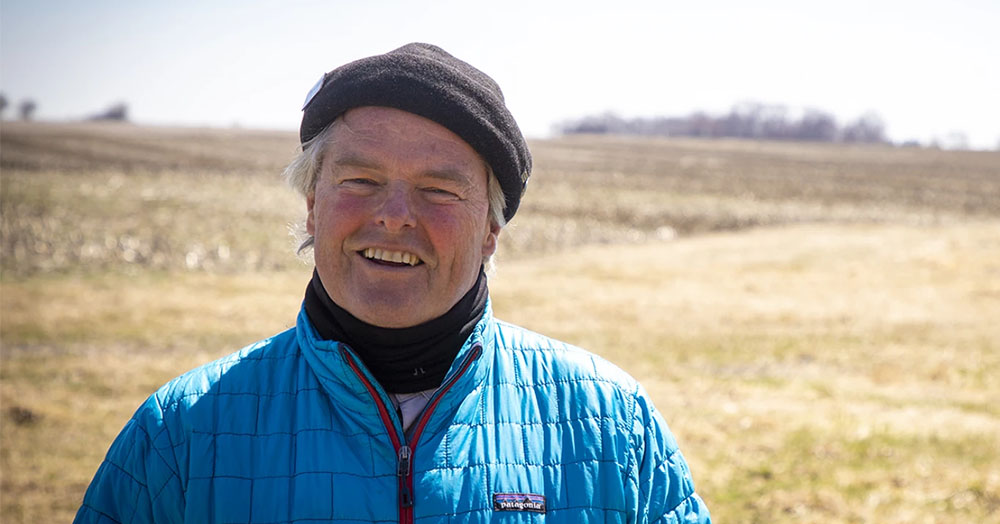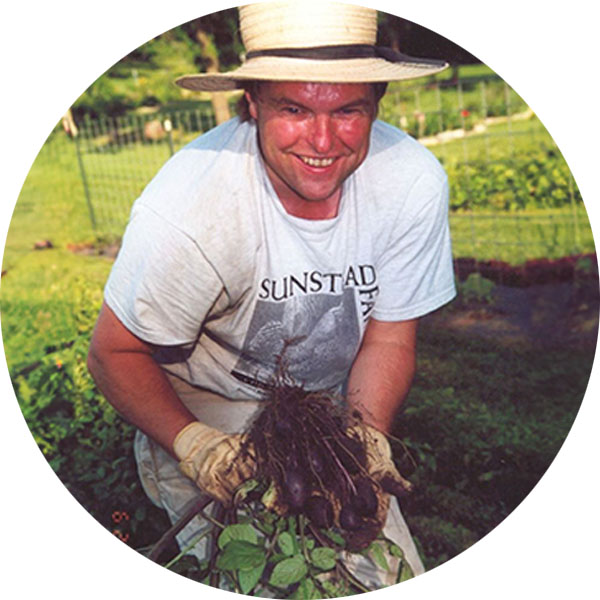Iowa Law Alumnus Helps Protect Nation’s Food Heritage
 PHOTO: CLAY MASTERS, WITH PERMISSION FROM IOWA PUBLIC RADIO
Iowa law grad Neil Hamilton, pictured here on his family's farm in Adams County, serves as chair of the board of directors for Seed Savers Exchange, a Decorah-based nonprofit that preserves heirloom seeds and plants.
PHOTO: CLAY MASTERS, WITH PERMISSION FROM IOWA PUBLIC RADIO
Iowa law grad Neil Hamilton, pictured here on his family's farm in Adams County, serves as chair of the board of directors for Seed Savers Exchange, a Decorah-based nonprofit that preserves heirloom seeds and plants.
Neil Hamilton (79JD) never met Baptist John Ott, an Iowa farmer born to German immigrants in 1894. However, both men wound up being deeply connected to a place that is preserving plants for future generations.
When Ott’s father sailed to America in 1883, he tucked morning-glory and tomato seeds among his few belongings. Today, the seeds from those heirloom varieties—“Grandpa Ott’s” morning glory and the “German pink” tomato—are among more than 20,000 available through Seed Savers Exchange, the nation’s largest nongovernmental seed bank. Hamilton, an emeritus distinguished professor of law and former director of the Agricultural Law Center at Drake University who has advised presidential candidates, chairs its board.
 PHOTO COURTESY NEIL HAMILTON
Neil Hamilton, who runs Sunstead Farm near Waukee, Iowa, harvests potatoes from the garden.
PHOTO COURTESY NEIL HAMILTON
Neil Hamilton, who runs Sunstead Farm near Waukee, Iowa, harvests potatoes from the garden.
In 1975, Ott’s granddaughter, Diane Ott Whealy, co-founded Seed Savers—which sits on the 890-acre Heritage Farm near Decorah, Iowa—with her family’s two ancestral seeds. Hamilton joined its board in 1996 after receiving attention for an article he wrote about the legal issues surrounding plant genetics.
A former assistant attorney general for the Iowa Department of Justice and past president of the American Agricultural Law Association, Hamilton continues to steer Seed Savers as it nears a half century of supplying gardeners and chefs alike. “We are the Noah’s Ark of heirloom seed varieties,” Hamilton says. “We’ve had a significant impact on American eaters—and profoundly influenced restaurants’ approaches to food diversity.”
Throughout the last century, the world has lost 75 percent of its edible plant varieties, and according to a 2024 report from the U.S. Department of Agriculture, more than 90 percent of the country’s corn, upland cotton, and soybean crops now grow from genetically engineered seeds. Such shifts have had a profound impact on plant biodiversity and food security.
That’s why Hamilton works with Seed Savers to safeguard endangered garden and food crops—and share heirloom seeds and plants with everyone from farmers to restaurateurs.
“It’s important to keep telling the story of the vital role these seeds play for humanity.” —Neil Hamilton
When he was growing up on a family farm in Adams County, Iowa, agricultural law was in its infancy, and rural issues such as seed preservation weren’t in the spotlight. He wanted to help change that reality, so after earning a forestry degree from Iowa State University in 1976 and working for former U.S. Sen. Tom Harkin during his first congressional term, Hamilton enrolled in the University of Iowa College of Law’s now-defunct agricultural law track. From there, he launched a long and notable career of teaching, publishing, and shaping policy in the field of agricultural law.
Along the way, Hamilton donated part of his family farm to the Iowa National Heritage Foundation, where he has been a board member for more than three decades. He did so because he believes in “walking the walk” for the organizations he serves. He and his wife, Khanh, also maintain Sunstead Farm—a 12-acre market garden at their home near Waukee, Iowa—where they grow several Seed Savers plants, including zinnias, tomatoes, and leeks.
“You have to hold the mission in your heart,” Hamilton says. “It’s important to keep telling the story of the vital role these seeds play for humanity.”
